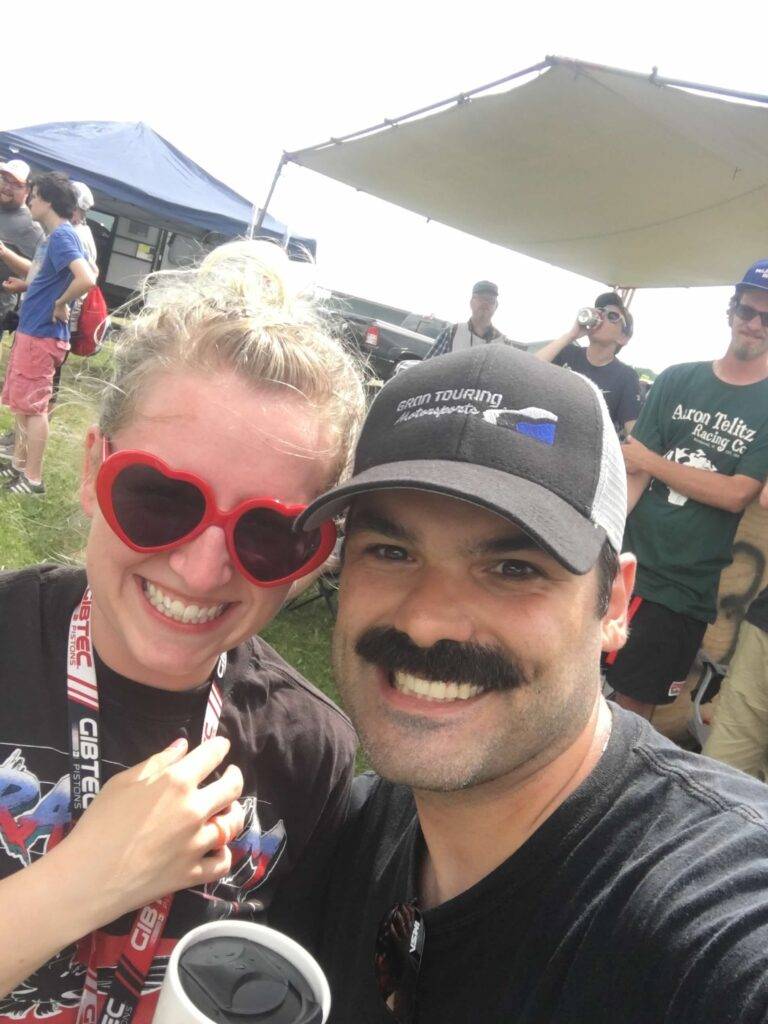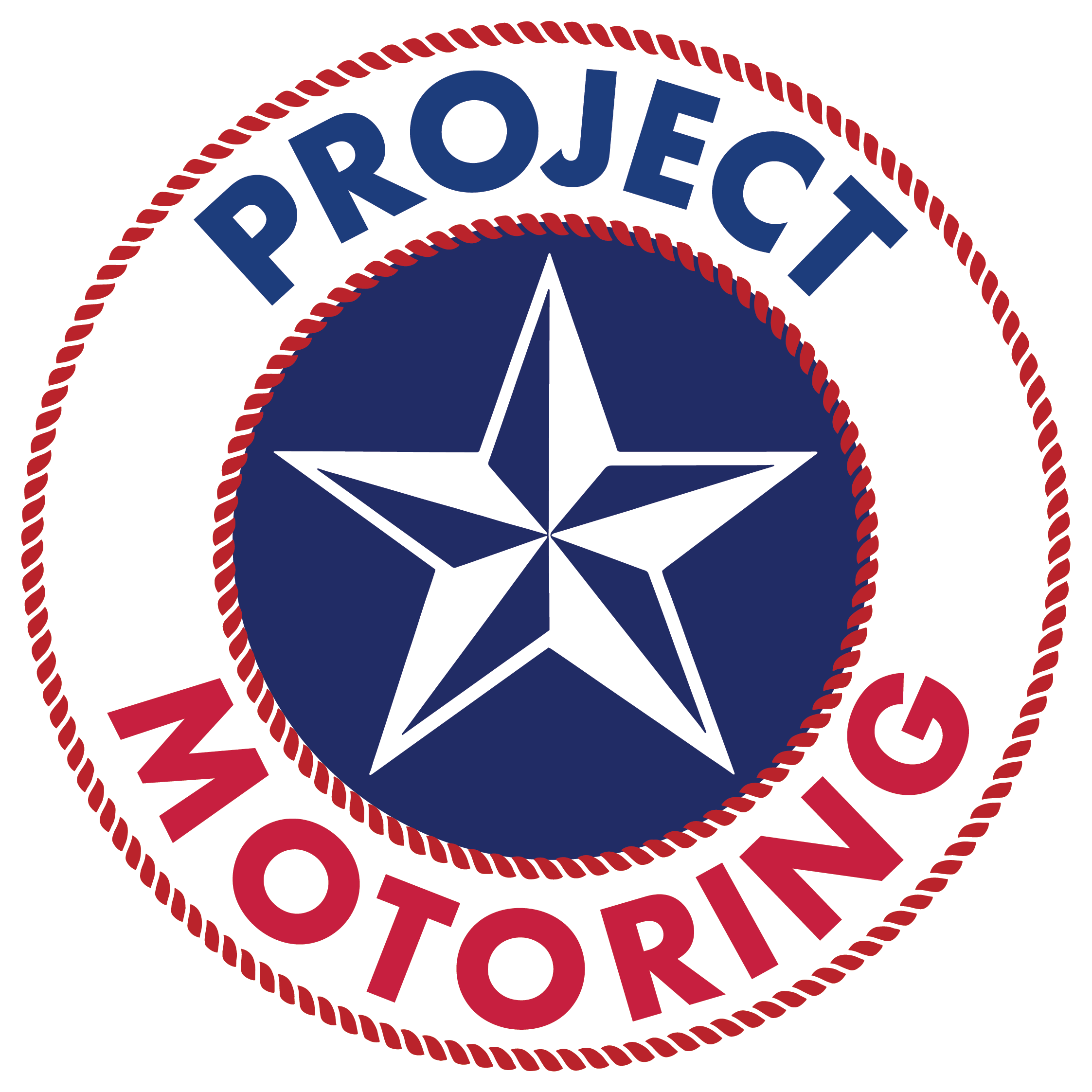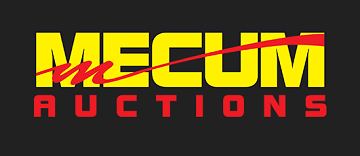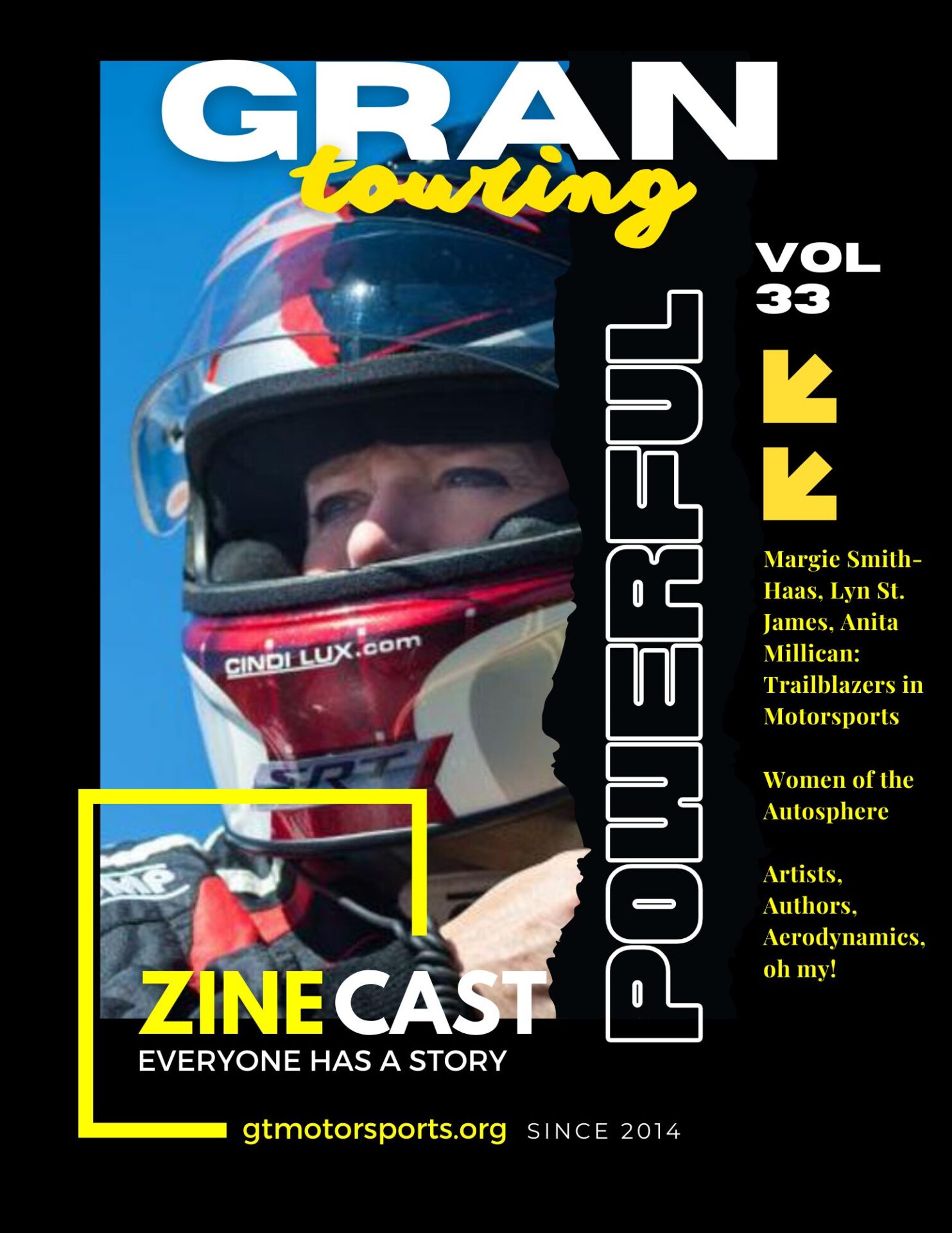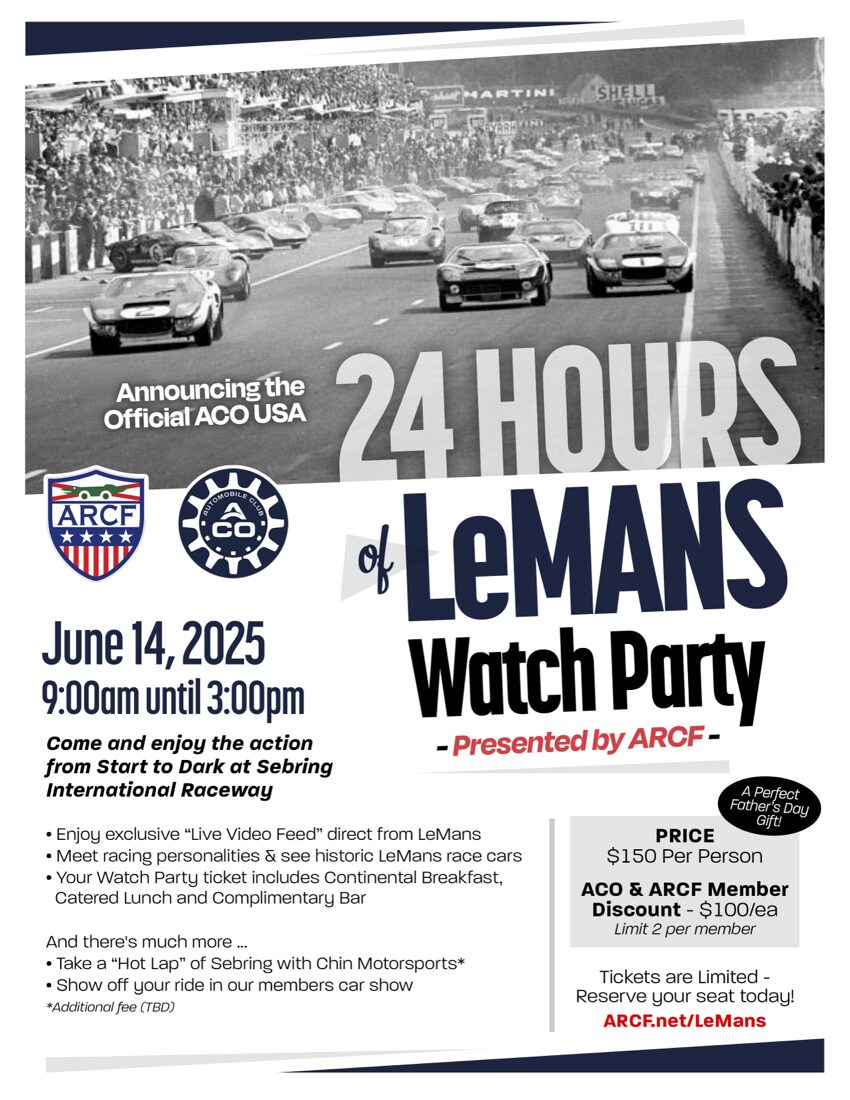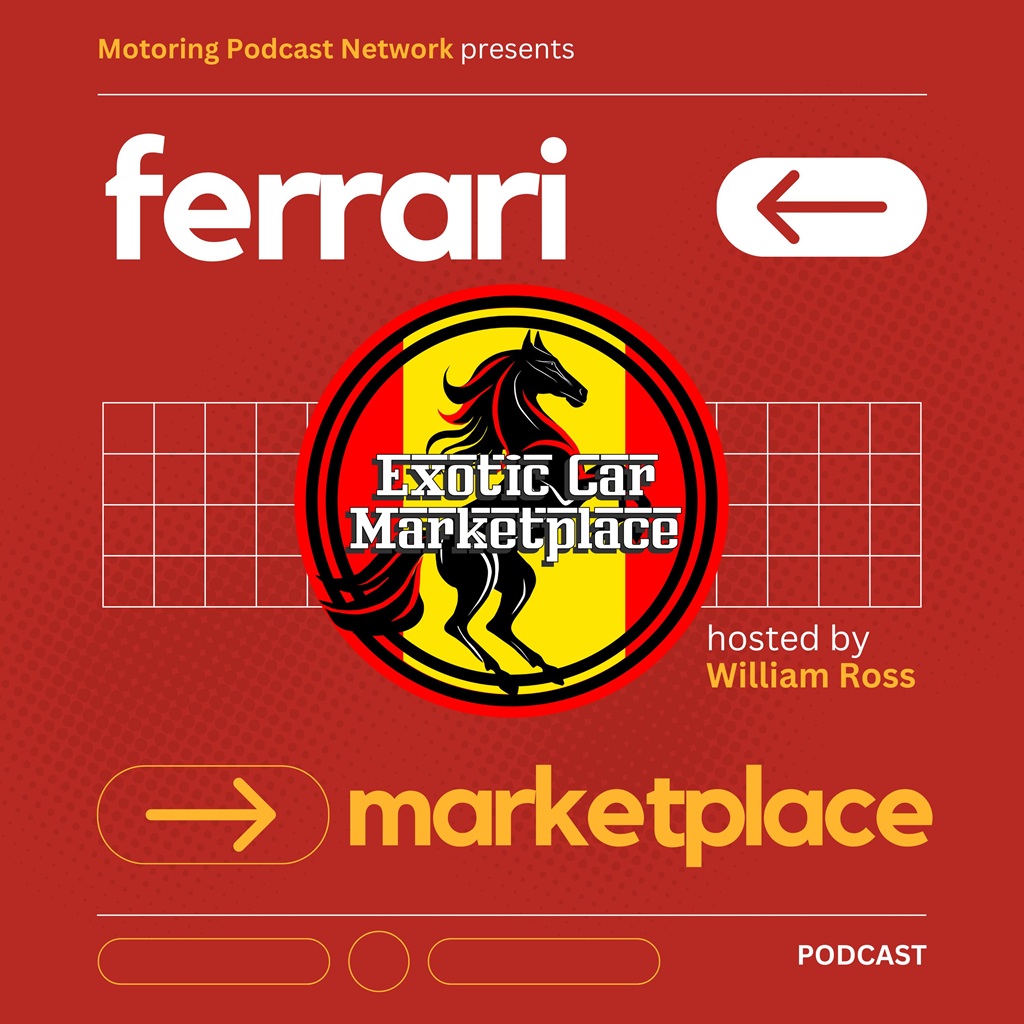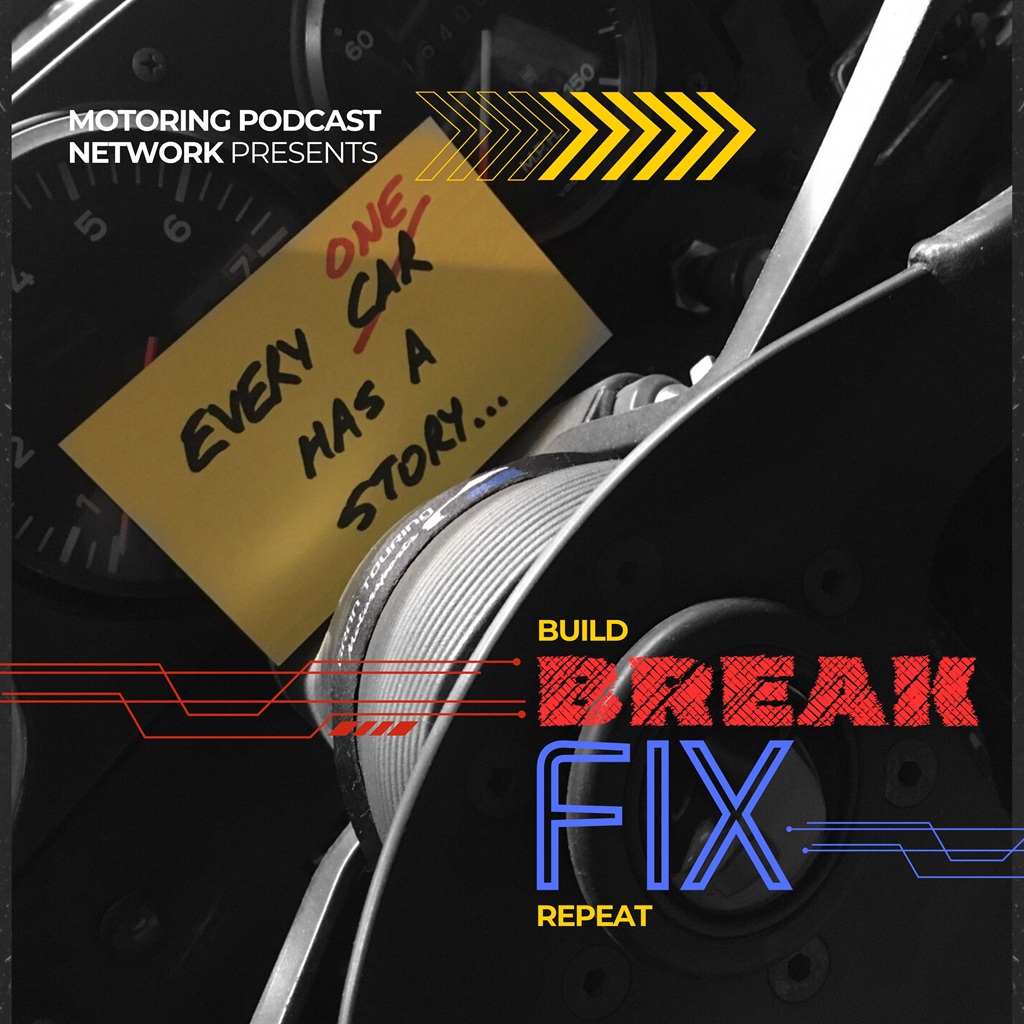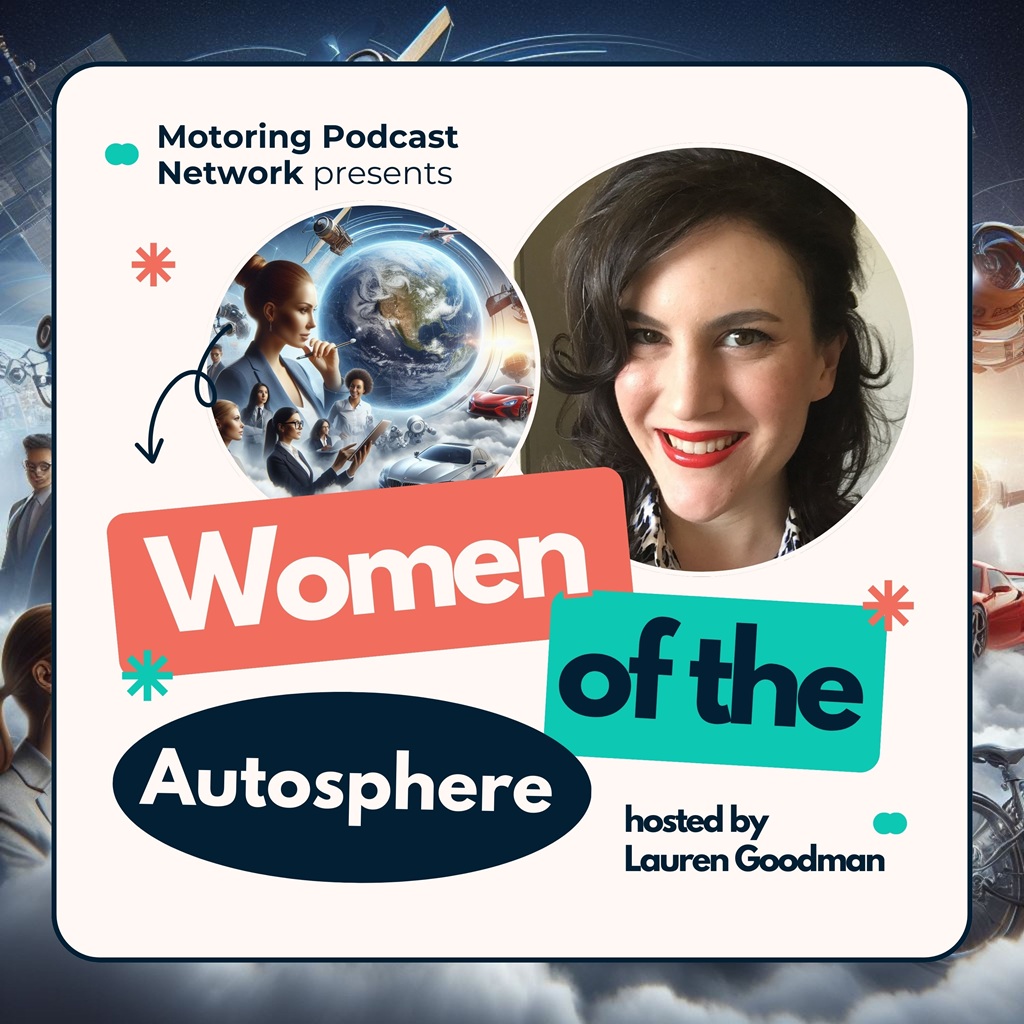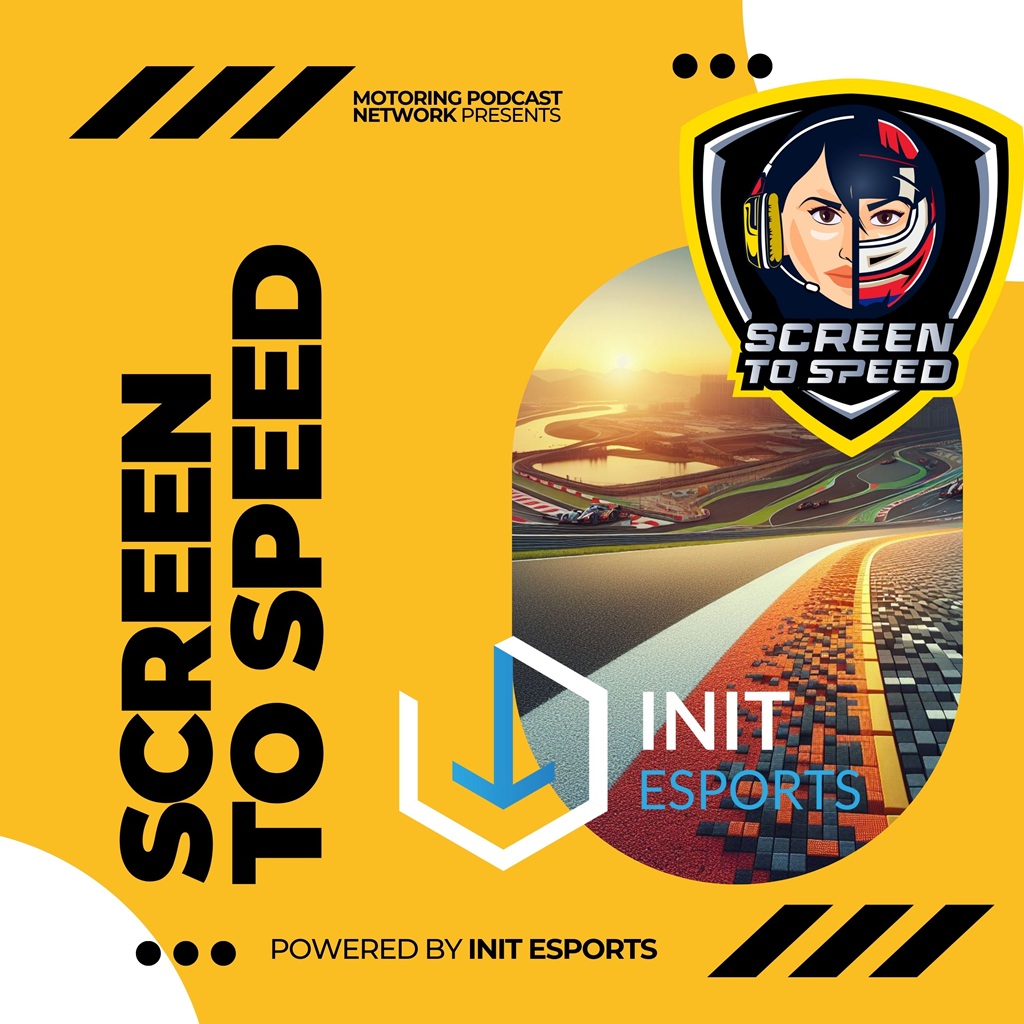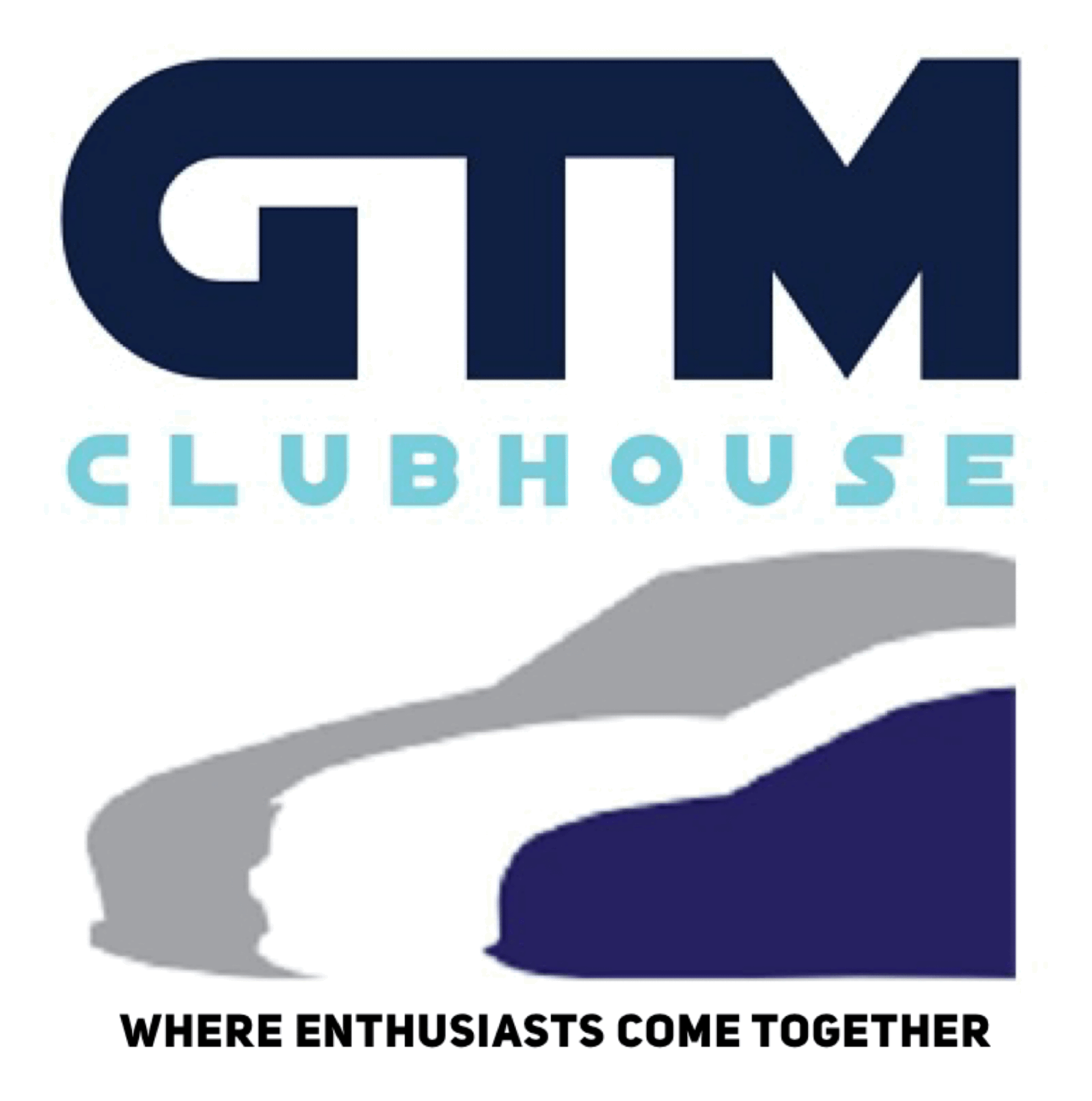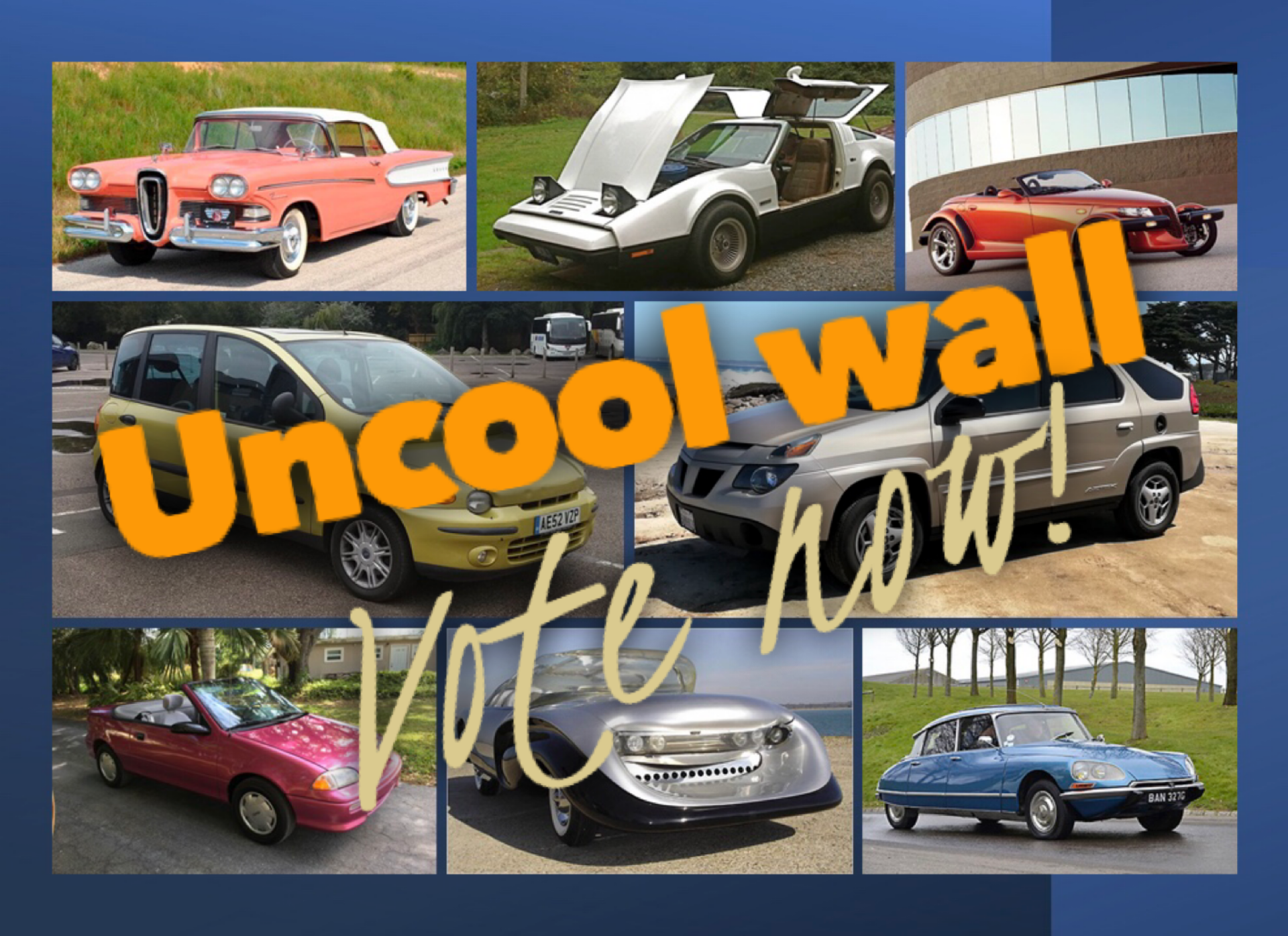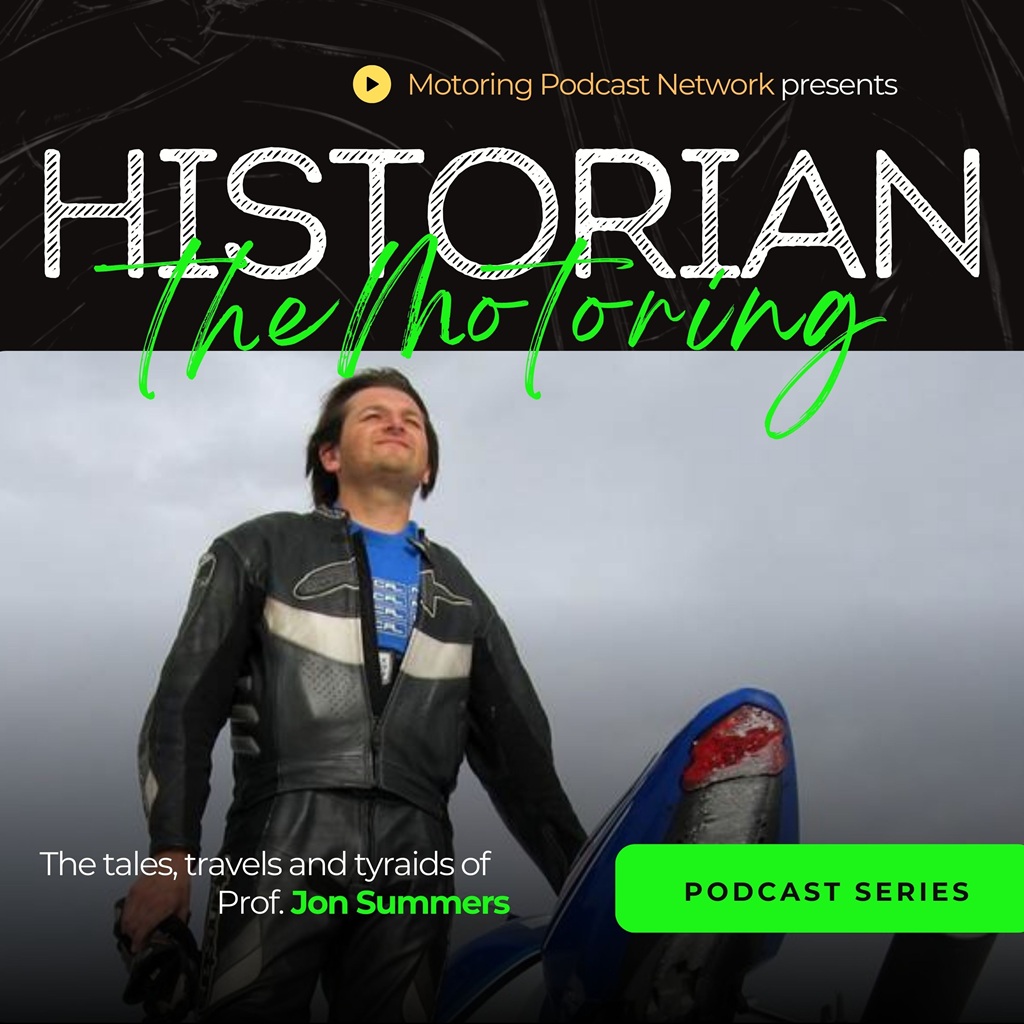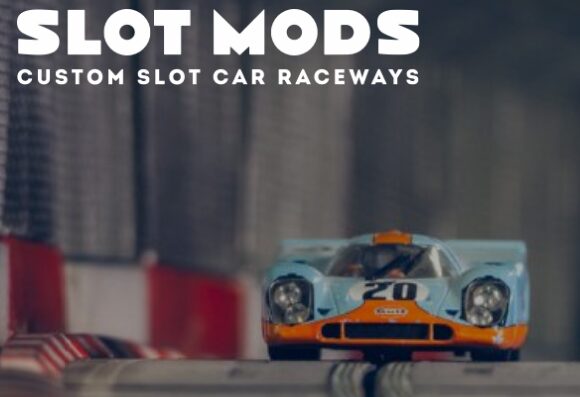We all have passions, desires, and interests that keep us moving and help us get through the monotony of day to day life. If you’re lucky, you may be able to combine your passions and turn them into a successful career. Our guest has taken her life long passion for racing and found a way to combine it with her love for the written word.
You’ve probably seen our guest roaming around a paddock near you, wearing her signature heart-shaped sunglasses and “emotional support TransAm crop top”. Her work spans automotive outlets like Jalopnik, A Girls Guide to Cars, Donut Media Podcast, The Drive, RACEWKND and many others. Joining us is writer, editor, journalist, podcaster and novelist Elizabeth Blackstock.
Tune in everywhere you stream, download or listen!
 |  |  |
- Spotlight
- Notes
- Transcript
- Highlights
- Learn More
Spotlight
Elizabeth Blackstock - Writer/Editor for Jalopnik

I'm Elizabeth Blackstock, and you can find me wearing heart-shaped sunglasses at a race track somewhere around the world. My passion for cars has often been literary, and that's how I've found myself where I am today: the managing editor at A Girl's Guide to Cars, the breaking news editor at Jalopnik, regular contributor to The RACEWKND, dual-degree masters holder, and author of several upcoming motorsport books. I'm always looking for new ways to grow my skills and take on my next challenge.
Contact: Elizabeth Blackstock at elizablackstock@gmail.com | N/A | Visit Online!![]()
![]()
![]()
![]()
![]()
Notes
- Did you come from a racing family? Were you into cars at an early age? What got you interested/involved?
- For anyone, especially a writer, discovering that you can link your passion for motorsports and your passion for words together and turn them into a successful career is amazing, but many people are probably wondering “How do I do that?” Walk us through your journey as a motorsports and automotive writer
- We read one of your blog posts about the difficulties you had as a freelancer, talk to us about that side of the business. Any advice for those looking to take a similar plunge?
- You’re the Co-biographer of Rich Energy‘s Formula One saga (with Alanis King) – Let’s talk more about writing a book as compared to journalism. Many people say “I’d love to write a book” but it all becomes very real when you sit down at the screen and start a journey of 85,000 words.
- Have you had the experience or the desire to get behind the wheel of one of the racecars you report about? Which is your favorite (dream car/dream drive)?
- We’ve been very fortunate to have several Glorious Ladies of Racing on this show, and we noted that one of your sweet spots is “History’s forgotten female racing drivers” – Are there any dead/alive that you’d like to meet or interview?
and much, much more!
Transcript
Crew Chief Brad: [00:00:00] BreakFix podcast is all about capturing the living history of people from all over the autosphere, from wrench turners and racers to artists, authors, designers, and everything in between. Our goal is to inspire a new generation of petrolheads that wonder How did they get that job or become that person?
The road to success is paved by all of us because everyone has a story.
We all have passions, desires, and interests that keep us moving and help us get through the monotony of a day to day life. If you’re lucky, you may be able to combine your passions and turn them into a successful career. Our guest has taken her lifelong passion for racing and found a way to combine it with her love for the written word.
Crew Chief Eric: You’ve probably seen our guests roaming around a paddock near you wearing her signature heart shaped sunglasses and emotional support, Trans Am crop top. Joining us tonight is writer, editor, journalist, podcaster, [00:01:00] and novelist, Elizabeth Blackstock. So welcome to break fix. Transcribed
Elizabeth Blackstock: Hi guys. It’s so good to be here.
Thank you for having me. I’m excited. It’s going to be good.
Crew Chief Eric: Absolutely. So like all good break fix stories, there’s always a superhero origin. So tell us the who, what, where, when, and why of your petrolhead story.
Elizabeth Blackstock: Oh, so I grew up in Michigan. My dad was a mechanical engineer. My whole family, they worked for GM.
So I was in with the auto industry pretty young. My dad had a lot of and an eighties Mustangs. I grew up sitting in rims that were in the basement and just hanging out. We also watched NASCAR on Sundays. So with all of that kind of combined, it was destiny. I think I was just born and raised into it. I did get out of the whole car thing and racing for a little while.
While I was a teenager, cause it wasn’t cool to like what your parents liked. So I pushed myself away from that, got really into music and then. I saw Rush and I was like, okay. Yeah. This racing thing is really cool. I’m gonna get more into that.
Crew Chief Brad: Your family all worked at gm? [00:02:00] Yeah. You had a Barracuda and a Mustang.
How does that add up? So,
Elizabeth Blackstock: my dad, , my dad was not for gm. My dad was the one in the cars and my mom’s side of the family, it was GM workers. So there was always a big rivalry of like, which was the best, which, Mm-Hmm. .
Crew Chief Eric: Mm-Hmm. . Yeah.
Elizabeth Blackstock: So I grew, I grew up with that whole situation going on.
Crew Chief Eric: So were there Corvettes on your wall as a kid?
I mean, what was the poster up there?
Elizabeth Blackstock: My dad actually, he used to hand draw his own pictures and stuff. So we had a ton of his art and I still remember he had like a 68 Corvette. That was like his dream car, dark blue with a white racing stripe. That was his jam. So that was kind of what we had. Otherwise we didn’t really hang anything else up on the walls.
It was just like what my dad made.
Crew Chief Eric: Did he ever see that dream realized?
Elizabeth Blackstock: He did not. No, unfortunately, like it was. It was just a gorgeous car and that’s a lot of money to restore it. So
Crew Chief Eric: you
Elizabeth Blackstock: did not have those kinds of funds.
Crew Chief Eric: So would you say that’s the sexiest car of all time?
Elizabeth Blackstock: Yeah, I don’t think that’s a stretch.
Crew Chief Eric: Motivated by a [00:03:00] car family, you found yourself in the car world, interested in racing at an early age. There’s even pictures on your website of you in a Ford racing suit and things like that. So. You definitely come by it honestly, but you know, there’s a progression there. How do you go from the kid in the stands watching these races to becoming an automotive journalist?
So take us on that part of your journey as well.
Elizabeth Blackstock: When I was growing up, cars were like one part of my personality and writing was the other part. I used to like bring my parents to school. And I would force them to read until they could not physically speak anymore. At which point they were like, we should probably teach you how to do this yourself.
So I learned to read when I was pretty young and I learned to write at the same time and I was always making stories up and it didn’t actually come until well into my adulthood that I realized. I could write about cars and racing. I had no clue. I grew up reading road and track and car and driver, but I just didn’t make that connection in my head that that was something that was possible for me.
It just kind of happened. Um, I was at the university of Texas for my undergrad degree [00:04:00] in English literature and creative writing. And I was just inspired to write about what it was like to be a woman at the racetrack, as opposed to a man. And I posted that on my own blog and it kind of got traction. A lot of people picked it up and it was actually grabbed by Jalopnik way back in the day before I even worked there, like, Hey, can we repost this and give you all the credit?
So it went really well. There were a lot of people who were like, this is interesting. And I was like, maybe. This is the thing I could do for my career. Like maybe I could actually do this out of that story that I wrote. I wrote a couple more Red Bull America’s found. A lot of women was like, Hey, we want you to freelance for us.
I had no idea what I was doing at the time. I was just kind of getting my feet wet. And then Jalopnik reached out and asked if I wanted to be a weekend writer. So I started out just Saturdays only. It just kind of progressed. I really like what I do. So I do it a lot. People seem to appreciate that.
Crew Chief Eric: You grew up in the upper Midwest, right?
With that Motown vibe, there’s a certain car culture in that area of the world. Then you find yourself in Austin, [00:05:00] which is a completely different car culture. You’re in the deep South at that point or the Republic of Texas, really. And then you’re postgraduate work was at Arcadia, which is outside of Philadelphia.
And now you’re in the Sunoco VP racing fuels area. So three different distinct car cultures there. So where did you find yourself aligning? And did you then get exposed to different disciplines of motorsport at the same time?
Elizabeth Blackstock: Yes. All of that was big. Yes. I mean, I still find myself drawn to muscle cars from what I grew up with.
That was like my family’s thing. And when I still like look at a car, that’s kind of like the look I’m going for and the feel I’m going for. I love the electric future. I think that’s great. Also, I want a car that makes a lot of noise and I want to be able to feel it in my teeth when I started, that was kind of where I stuck with, but as I got older, obviously traveling, living, existing in various places around the country, it was starting to realize like this looks so different everywhere else.
Like you come down to Texas and I [00:06:00] still. Like there’s no rust on the cars, which completely changes how people respond to the auto industry. And like the classic car industry, cause you’ve got a lot of pretty perfect vehicles. Like my husband and I bought a 1996 Suburban, no rust on it at all. And that’s because it started out in the North and then made its way down South for the rest of his life.
The paint is not great, but that’s a different story. In Texas, there’s a lot of the low riders is, you know, you get a lot of stuff coming across the border, which is always fun, especially now that I live down in the South part of South of San Antonio can kind of see like the rebadged cars, like the Ford F 150, that’s the Ford Lobo.
Those are always my favorite to spot. And then when I was up in Pennsylvania, I was so close to so much. Racing. So I went to my first short track races. My first dirt track races went out to different rally events. Like I just wanted to kind of see what existed out there. I feel like it’s kind of helped.
I still love open wheel racing and I still have my muscle cars. Those are my passions. But having seen where [00:07:00] everyone else is coming from, like I get it. You know, I appreciate it a little bit more than I probably would have if I had never had experience with those things.
Crew Chief Eric: Open wheel. Are we talking IndyCar or Formula One?
Elizabeth Blackstock: IndyCar. IndyCar. IndyCar is my number one. Formula One is number two, but IndyCar is always where it’s going to be for me.
Crew Chief Brad: Talk us through, like, all the other things you’re working on. I mean, Managing Editor at A Girl’s Guide to Cars, Contributor at Capital One Autos. I mean, the list on your website goes on and on and on.
You’re a very busy woman.
Crew Chief Eric: Yes. Where do you find the
Elizabeth Blackstock: time? Oh, I don’t. That’s the problem.
Crew Chief Brad: Not Tuesday evenings.
Elizabeth Blackstock: Yeah, no, not Tuesday night. I started out at Jalopnik. That was kind of where I got my feet. I went from weekends to full time. And then in 2020, I was just not happy with how that was going because it was also in grad school full time and I was getting two degrees, so I was writing.
Two graduate theses while also working full time, trying to have a life and exist as a human being. So I stepped back, went to freelance [00:08:00] exclusively for most of 2020. It’s kind of a mistake. No one knew the pandemic was happening when I stepped back from my full time role. So a lot of the sites that I was planning on working for cut down on their freelance budgets and everything.
That was where Girls Guide to Cars came in. And I reached out to them and I was like, I just want to write about cars. I don’t care how much you pay. I don’t really like whatever I want to do it. I was working with front stretch doing IndyCar coverage. And so girls guide to cars kind of turned into, I would write for them a lot.
And I was regular, you know, that whole site is basically just freelancers. There’s like two. full time employees. And then I was the third after a little while when I became the managing editor, just cause I was like constantly doing things. It was a really good experience of learning how to talk to a lot of people and get to learn different writing styles.
Every freelancer was different. Some people were more difficult to chase down than others, but it was a really great learning experience. Moved into Capital One, they reached out about their auto navigator program. So just kind of some basic stuff about [00:09:00] Buying cars, new cars, electric cars, the basis of information.
Thankfully, I went back to Jalopnik full time October of last year. It’s almost been a year.
Crew Chief Eric: I want to touch back on a girl’s guide to cars because we’ve had Anika Carter on here is also a writer for a girl’s guide to cars. She’s one of the newest ones over there, but we also had a fellow managing editor on recently, Sarah Lacey.
Elizabeth Blackstock: Yeah, there’s great. I love Sarah.
Crew Chief Eric: So she filled in for Brad for one of our drive thru episodes. And then we did a showcase around her and the history of a girl’s guide to cars. Obviously, we named dropped you and a few of your compatriots on there as well. But I wanted to ask you, one of their big things is women think differently about cars and it’s part of their mantra.
And so I wanted to get your take on that and what that really means, especially bringing the motor sports side to the larger equation. You know, you go there, you see a lot of SUVs and, you know, stuff like that, but. What’s your take on a girl’s guide to cars?
Elizabeth Blackstock: So that was the thing that I really actually liked about that.
When I was working there was it, I constantly had to be reminded like you have a level of knowledge about this that our readers probably [00:10:00] don’t. Actually in the industry, these people kind of want to see cars more as a utilitarian tool. It was a nice mind shift because not everyone really cares about cars.
Like if I looked at my sister and I was like, Hey, name that car out there. She would probably have no idea. You know, I went to visit some friends a little while ago and they had no idea how to like, Check their tire pressure. So it was just kind of basic things where there were these reminders happening that, you know, some, most people don’t relate to their cars with a passion, like people relate to their cars as a tool that gets them from point A to point B that does the things they need it to do.
It’s an
Crew Chief Eric: appliance, like they’re toasted, right? Yeah,
Elizabeth Blackstock: exactly. It’s a, it’s an appliance. You appreciate the fact that you have a stove, but you don’t really have to be passionate about what that stove specs are in order to use it. It was an interesting mind shift, but there was also the opportunity for me to take my perspectives on motor sport and on like a Dodge Challenger that I drove to take these and like, here’s why this is empowering for women.
[00:11:00] Here’s a different perspective on it. You know, you don’t have to be passionate about it, but you can appreciate the feeling that you get when you’re driving something that’s a lot faster. Then, you know, what you take the kids to school in to just bring it down to a different level of this is the visceral feel you’re going to have from this vehicle.
Here’s a different way you can look at what cars are, you know, see it as something enjoyable instead of just like, this is another part of my life.
Crew Chief Eric: All right, so I got to ask this pit stop question. Coupe, sedan, convertible, hatchback, station wagon, or minivan?
Elizabeth Blackstock: The answer is going to be hatchback. Like I’m a real sucker for hatchbacks.
I have a little Mazda too, and it’s the love of my life.
Crew Chief Eric: B specs for the win. Yes,
Elizabeth Blackstock: that was the first car I bought when I got to college and I’ve had it ever since taking care of it. It’s my little go kart. It’ll be hatchback.
Crew Chief Brad: We’re hatchback fans here as well.
Crew Chief Eric: There’s a constant debate about what a hatchback really is versus a lift back.
There’s some subtle nuances there, but it’s okay.
Crew Chief Brad: We like all things [00:12:00] with the bags open.
How did you turn your writing career into being a contributor on the donut racing podcast? It’s
Elizabeth Blackstock: a long story. I constantly think of myself. Like I didn’t start out as a writer. I started out as a shit poster on the internet. I just like made jokes, gained some following solely based on that, like that was how I knew people from Jalopnik who read the story that I wrote was because I just made memes about Formula One, and there were like 10 other people who actually cared about what I was doing.
That was kind of how that started, you know, obviously it turned into a book. I was working full time at Jalopnik, but Jalopnik has like questionable credentials depending on who you ask, there are a lot of polarizing opinions about the website, which is fine, but when I started the book with Alanis King on Rich Energy and Formula One and the Haas Saga of 2019, that kind of gave it a legitimacy of like, okay, well, she’s not just a jokester and she probably knows what she’s talking about.
A little bit difficult to get that credibility when you’re a lady [00:13:00] sometimes. I think the donut folks reached out because they recognized that I had like a similar sense of humor about stuff. Like it wasn’t taking formula one so desperately seriously. And when you like, look at a lot of the podcasts about F1, it’s just a lot of boring British dudes talking deep specs and news and technical regulations.
And like, that was not something I cared about. Um, and that was not the direction they wanted to go. Can’t even remember who it was who reached out. There’ve been like a bunch of changes since we first talked about. The doughnut racing show, which started out in 2020, like that was when the idea was pitched and it finally kind of came to fruition.
Nolan Sykes, like we had followed each other on the internet. Alanis was an obvious next choice. She and I vibe really good. You have to, when you write a book with someone. So it kind of just spiraled into this. Let’s do something that’s fun, gossipy, but also brings in the race experience of like, here’s something for the hardcore fan, but here’s the off track drama that you might care about or that you might find interesting.
It’s been a good blend.
Crew Chief Eric: We know that Nolan is [00:14:00] the calmer, more mild mannered of the two, right? So does James Humphrey actually scream as much in person as he does on video? Yes.
Elizabeth Blackstock: He’s a very animated person to have a conversation with. Keeps it fun. Gotta have that energy flowing. Bring you up to speed! Yes.
Crew Chief Brad: Yes,
Elizabeth Blackstock: exactly.
Crew Chief Brad: We definitely want to dive into the book writing. You mentioned you co wrote it with Alanis King. How did that, the writing experience of writing the book, compare with The, you know, the journalism in the writing of the articles and stuff like that.
I know a lot of people, you know, say, Oh, I’d love to write a book, but when it comes down to sit there and write 85, 000 words about one topic, it kind of scares people away. So how, how was that experience?
Elizabeth Blackstock: So I wasn’t ever really scared of like the longer format. My introduction to writing has always kind of been the longer ones.
Like when I was in high school, every November I would do national novel writing month. So you write 50, 000 words in the month of November, usually for just one project. That was something I did every year. So. That [00:15:00] was what I wanted to do. Like when I got to college, it was really hard to transition to my creative writing classes that were like, you have to have this a thousand words or less, and I’m like, I want to give you a book, I have too many ideas.
I kind of offered that perspective to Alanis, her response. So the day I left Jalopnik, full time as a staff writer, a literary agent reached out to myself because I had posted my email address. In my goodbye blog to say like, Hey, here’s how you can find me. And he was like, I just watched drive to survive.
I just saw the episode with rich energy. I Googled it to learn more. And the blog that you and Atlantis King popped up, there’s so much here. Do you want to write a book about it? So it just kind of turned into like. Yeah, why not? We were like, if we added up all the blogs that we wrote about Rich Energy and the whole saga on Jalopnik, it was pretty close to a book.
So we could probably flesh it out a little bit more. Obviously, it’s a little bit more challenging than that. There was a lot of research that had to be involved. That was the most challenging part, actually reaching out to people, asking them for [00:16:00] information, trying to track down leads, especially with something like formula one, there are so many NDAs and so many people who are like, I can’t say anything about anything because I don’t want my entire career to collapse.
Crew Chief Brad: So
Elizabeth Blackstock: that was kind of. Challenging, digging through financial documents and court records, all of this in different countries. So like trying to translate Czechoslovakian and understand the context of what these trademark companies were writing about. I think that was the hardest part. When it came to putting things together, Alanis and I had a pretty good trajectory of what we thought we wanted to do.
And when you write a non fiction book, you have to, uh, create a proposal. So it’s like this a hundred page document that talks about who you are, why you’re the person to write this book, you have to give a writing sample. So we just gave our first chapter where you are going to get your research from and you have to do a layout of all the chapters.
So we had our chapters like summarized and named well, before we actually sat down to write the book. And then once [00:17:00] that happened, it was pretty simple. Alanis and I are both. Very verbose people. We like to talk. We like to say words. Having the split between the two of us also really helped. So there were some things that I took and some things that she took.
I did all of the historical research for former questionable sponsors, like Moneytron or T Minus. And then Alanis was like on the court record side of it because she. Knew how to track those documents down in England. So it worked out really well. It was like, we each wrote half a book and then rewrote each other’s sections and edited them down into something cohesive proofread like nine times and fact checked like nine times until it is the thing that I have memorized and could probably recite.
Crew Chief Brad: Did you get access to the president of rich energy?
Elizabeth Blackstock: We did not. And that was the most difficult. So he follows both of us on Twitter. So we reached out to him cause we had to reach out with our questions that we had for him as your journalistic diligence. So we reached out via email, but we had no idea what his email was anymore because he’s moved.
[00:18:00] companies and change names so many times. So we sent it to him on Twitter. So we know he’s seen them. I can’t verify how many he’s seen because we sent him like 2, 000 questions. So he definitely like opened the thing and there’s a little, you know, red receipt was on. So he saw them. not choose to respond, which was really disappointing.
We were like 50 50 on whether or not he would want to control the narrative that we were writing or if he would say nothing at all. He had worked with us before at Jalopnik. So I think he, he knew that we don’t care. Like we’re not taking his word for it. We’re doing the other research. He was not interested, which was disappointing, but a lot of other interesting people were.
Crew Chief Eric: See Brad, as our listeners know, this is why I refuse to watch Drive to Survive. Why do I have to do that when I can read Elizabeth’s book?
Elizabeth Blackstock: Exactly. It’s all you need from 2019, like right there distilled. And some history too.
Crew Chief Brad: Well, that’s not true. You also need a case of rich
Crew Chief Eric: energy.
Elizabeth Blackstock: Oh my God, the whole case.
Look at that.
Crew Chief Eric: [00:19:00] That’s one of like two or three that he bought. We just remember when we got together at Watkins Glen for his bachelor party, we destroyed a case of that stuff while we were there.
Elizabeth Blackstock: Yeah, no, that’s right. I didn’t know you Still had some ah mm-Hmm. . The only time I’ve drank that is at a racetrack and it’s usually been because I’ve been drinking too much
Crew Chief Brad: Yeah. I’m, I’m expecting it to be worth tens of dollars someday.
Crew Chief Eric: Yeah. More than the dogecoin they gave you for your cyber truck. That’s all I’m gonna say. Okay.
Crew Chief Brad: That, that’s true. My cyber struck pre-order is still for sale.
Crew Chief Eric: So that said, Elizabeth, I got to ask this puzzling question about rich energy because every time I look at Formula One, all I see are derivatives of Red Bull, right?
We got Red Bull, we got Toro Rosso, we got Alpha Tauri, rich energy. How many more sports energy drink companies are going to sponsor Formula cars?
Elizabeth Blackstock: A lot, that’s the problem. I mean, you even go back all the way to T minus and that was like an energy drink company, but also an everything else company.
There’s so many weird ones. I think you can just get away [00:20:00] with energy drinks because they’re probably not that difficult to make. You can commission certain manufacturing facilities to just make you a drink, put it in a can and distribute it for you. So like you can feasibly do this pretty easily. Like you go to the grocery store nowadays and I’m like, I don’t even recognize.
Yeah. What these energy drink brands are. They’re not even motorsport, but they just exist and they’re weird.
Crew Chief Eric: Do you remember that show? It’s something Todd Margaret with the guy who played Tobias Fumke from Arrested Development, where it’s all about the energy drink that’s built in a warehouse and it gives people all sorts of weird, like reactions.
That’s what I think of when we start talking about this.
Elizabeth Blackstock: Like this is pretty much what it was. It was just weird. Like a guy called a facility in Austria and was like, make me a beverage. And then just like, didn’t distribute it.
Crew Chief Brad: Eric, I feel like this is our next big strategic plan. What is GTMs energy drink going to be?
Crew Chief Eric: It’s called decks. Cool.
Crew Chief Brad: I like it.
Crew Chief Eric: So that said, Elizabeth, that anybody [00:21:00] follows you online and follows your writing, you are anywhere and everywhere on the planet following these racing stories from here in the States to overseas and everything in between. So I wonder, with all this experience you’ve had over the years, have you ever had the desire to get behind the wheel of one of these race cars?
Or have you turned laps on track before? And if so, or maybe not yet, what is your dream car or dream drive or dream track?
Elizabeth Blackstock: My husband just gave me the finger guns because I have an ARCA test coming up at some point in the near future, probably in January. So That’s going to be the first time I officially like turn laps in a race car.
I’ve done like driving schools. So like the Corvette performance driving school in Las Vegas kind of, sort of counts, not really, it’s not a race car, but I had to wear a helmet. So like maybe, yeah, I’ve always wanted to, like, I walked up to Robbie Gordon in the paddock at Coda when IndyCar was at Coda. And I was like, how much would it cost for me to drive one of these things?
And [00:22:00] he was like, if you give me 10, 000, you can race it. And I was like, awesome. I’ll come back.
It’s on my list. Like, I’d love to,
Crew Chief Eric: you know, whose story, this sounds an awful lot like Brad. Who’s that? It sounds a lot like Lynn St. James’s story, right? Cause she used to cover cars and journalists as well. And every time she was at a race, she kept saying, guys, What’s it going to take to get me into one of these cars?
And one day they did put her in one of those cars. So that was pretty cool.
Elizabeth Blackstock: Exactly. That’s how you got to do it. You just be around and make yourself annoying enough that people will just give you what you want. So you be quiet.
Crew Chief Brad: Eric has that in spades.
Crew Chief Eric: I try. What can I say? So since you reviewed not only all these races, but a lot of vehicles, especially for Outlets like a girl’s guide to cars, the drive and others.
Let’s throw some Pitstop questions at you. What are some of your favorite or least favorite cars and maybe some of the sexiest or ugliest cars in your opinion?
Elizabeth Blackstock: Oh, so I’ve driven a [00:23:00] Corvette, the C8, the new ones. I almost didn’t buy a house. Like I almost bought a Corvette. I think, yeah, they’re beautiful. I think those are probably like out of everything I’ve recently driven.
Out of everything, like you can look at, it just looks good. It’s affordable. Like it’s not like 200, 000 for the base model.
Crew Chief Eric: Yeah.
Elizabeth Blackstock: Yeah. It’s gotta be my favorite. Like, it’s just, it’s ridiculous, but I love it.
Crew Chief Eric: So you don’t see it as the American NSX or weird copycat Ferrari or anything like that?
Elizabeth Blackstock: I mean, it’s all of those things and it’s none of those things because it’s trying to be cool in every possible way and not really knowing how to bring it together.
Exactly. But it somehow works.
Crew Chief Eric: That’s printed on the entryway at GM, right? Trying to be cool, but we don’t know how.
Elizabeth Blackstock: Yeah,
Crew Chief Eric: exactly.
Elizabeth Blackstock: Out of everything I’ve recently driven, that was my favorite. I’ve also driven some less than stellar vehicles. Like I drove the Hyundai Kona, just base model, did not enjoy it.
Crew Chief Eric: Like I always [00:24:00] say, no one aspires to own a rental car. It’s just,
Elizabeth Blackstock: no, no, exactly. Some inspiring vehicles and some very uninspiring vehicles.
Crew Chief Eric: So I got to ask, what’s the ugliest car of all time?
Elizabeth Blackstock: Ugliest car of all time. Oh, is this because we wrote about the ugliest car of all time on Jalopnik today and everyone got upset?
No, we ask
Crew Chief Eric: this all the time.
Elizabeth Blackstock: Oh, that’s funny. Okay. So my coworker today wrote a story of like, what’s the ugliest looking car of all time? And he used the Ford RS 200 as the cover photo. I
Crew Chief Brad: saw that. Yes.
Elizabeth Blackstock: Yeah. People got upset. Oh God, ugliest car of all time. When we had that, like, state of just generic minivans in the late 90s and 2000s, all of those, every single one of those, my friend, her family would get a different minivan.
All the time, I could never tell the difference aside from like, when you get in and it’s like, Oh, this one has screens in the back of the headrests. But like, they were just also sad to look at. It’s not a very good answer, [00:25:00] but it’s my answer.
Crew Chief Brad: It’s a good enough answer. So, but it’s not the Pontiac Aztec is what you’re saying.
Elizabeth Blackstock: No, I, so I find that the Pontiac Aztec has some charm to it. It’s ugly, but it appreciates what it is. I can respect its self respect.
Crew Chief Eric: Adam must listen to our show because this article like speaks to something we’ve been talking about for weeks now.
Crew Chief Brad: Is there a bucket list event or vehicle or combination of the two that you’d like to write about that you haven’t written about already?
Elizabeth Blackstock: The Bathurst
Crew Chief Brad: 1000, top
Elizabeth Blackstock: of my list. I’ve wanted to go for years. I watch it every year. I just want to experience it so badly. And it’s like one of those ones that’s very difficult to get to.
I feel confident I could probably talk my way into most racing paddocks at this point, but not Australian supercars. That’s like, I just don’t have anyone there because it’s in Australia. And the 24 hours of Lamar is another one. Like, I don’t even want to like cover that as a journalist. I [00:26:00] want to go as a fan and like camp for the whole weeks and like live the life.
Just pretend that I’m French for a little minute. I think those are my two biggest ones.
Crew Chief Eric: Yes. Are you going next year for the hundred?
Elizabeth Blackstock: Okay. So I am trying to get something lined up with NASCAR for the garage 64 project that they’ve got going on. I want to go so bad. I’m trying to pitch it in a very interesting way of like, let’s do a feature series of the development of the car.
The selection of the drivers, then ultimately like getting there, I want to do that so bad.
Crew Chief Eric: But the hundredth only comes once, unless you wait nine more years and then there’s a second hundredth. It’s
Elizabeth Blackstock: like the Indy 500, it’s like hundredth anniversary and hundredth running. You can get one or the other.
It’ll be fine.
Crew Chief Eric: I’m going for the anniversary. I think it’s going to be epic. And only because you see all the cars that are slated to come out, Next year is going to be the grudge match of matches between marks that we haven’t seen on the big stage in a long time, like Cadillac, like BMW, [00:27:00] like Peugeot and Ferrari and Porsche and everybody in what used to be LMP one now in GTP.
I think it’s just going to be an epic, epic week of racing. So
Elizabeth Blackstock: it’s going to be a lot of fun. Like I like sports car racing, but it’s not my favorite discipline, but with everything that’s going on and the new car developments and, you know, the hypercar regulations. between series. Like I’m actually pretty stoked about it.
Like it’s nice to see a family coming together.
Crew Chief Eric: Yeah, it is. And it’s coming together on multiple levels, not just between IMSA and WEC, but also between IMSA’s, let’s call it sister organization, SRO world challenge. They’re getting more tightly coupled as well. You know, seeing things like the new S650 GT3 Mustang running in both series next year, which is pretty cool as well.
We’re always excited about multi class racing, sports car racing. It’s just, Probably some of the best stuff to watch live, not just on TV as well. I mean, that’s my opinion. Take it for what it is. Right. You know, we’ve been very fortunate on this show to have what we call several glorious ladies of racing.
And we’ve noticed that one of your sweet [00:28:00] spots is history’s forgotten female racing drivers. So I want to know in your research and part of your passion projects there, are there any, you know, Female racers dead or alive that you’d like to meet or interview?
Elizabeth Blackstock: Like all of them. I feel like that’s a problem I have when I start to kind of do these deep dives is that at the time, especially the older beyond like the eighties and back people weren’t asking them the right questions.
Like no one was reaching out to these female drivers to be like, Hey, what is this? Like, you know, you get some like Janet Guthrie who will publish their autobiography as well afterward. So you can kind of see how it was. From her perspective, but you just don’t get that. Like if you just read the newspaper reports of her racing career, you don’t get any of that.
So that’s the problem that you kind of run into with a lot of the older drivers. No one was writing that stuff. I would love to meet Janet Guthrie. Her autobiography completely changed. I think the way that I looked at writing about cars and racing, [00:29:00] and that was a book that I read a lot. So in my grad degree, I had to write a novel and that was one of my thesis projects that I had to do.
So I wrote about female driver in the 1970s competing in endurance racing in Europe, but like the way that Janet Guthrie kind of described her experiences, the way that she described being in a car was just so beautiful and evocative that I appreciated it on the level of like, Here’s someone who did something incredible and made history in motorsport, but also someone who like knows how to write about it, which can be so rare.
So there was kind of a double level there in terms of like the dead female drivers, Cheryl glass. I just want to, like, I want to know there’s so many unanswered questions about her life. The circumstances in which she died were very mysterious. Her family believes that she was killed by the police and the police say that she killed herself by jumping off a bridge.
She was harassed when she moved back to Seattle after she kind of retired from her career because she was black. There’s so much [00:30:00] that just like, we just don’t know. And it’d be so interesting to hear from her because women are rare in racing, but black women are almost non existent. And to have someone doing that in, you know, the 1990s, it was a different time.
Like, I just want to know, I want to know so much about her. It feels like we’ve done kind of a disservice by not remembering her more.
Crew Chief Eric: Absolutely. Absolutely. And, you know, there’s been so many women that have been trailblazers and, you know, over the years, and one of them especially is still on my list to talk to is sit down with Michelle Mouton.
You look at her career and what she did for women in motor sports. Again, like you’re talking about at that critical time in the late 70s, early 80s, where they were just throwing up stats and who won the race and things like that and not getting to her personal story. Now, going back, uh, To talk to her about what it was like to compete as the only female with the only female navigator, like almost forever until the more modern times, you know, the only person that has a female navigator in rally today is Seb, right.
And so it’s [00:31:00] still very rare to see. And so, you know, she’s on my list of people to talk to that, you know, I’d love to just sit down and pick her brain and I’m driving one of those iconic cars in rally every two, right. So to boot, but I have to ask, you know, outside of your own writing, Do you have any recommended reads or any authors that inspire you?
Elizabeth Blackstock: Oh God, there’s, there’s so many. I did my second graduate thesis on Virginia Woolf. I think she is probably my favorite author. Just the way that she presented women and relationships and trauma. Very interesting the way she like represented the world. Gave me a different way of thinking about things. I cannot recommend Janet Guthrie’s book enough.
Get it on her website so she makes money. It’s such a good story. A. J. Bimes Go Like Hell. It’s another one that, like, I have every passage in that book highlighted because I go back to it and, like, just look over it and get the good vibes of what it was like to drive cars.
Crew Chief Eric: That’s the story of the Shelby Omni, right?
Elizabeth Blackstock: Yeah, exactly.
Crew Chief Eric: That’s what GLH stands for. [00:32:00] Goes Like Hell. Ha ha
Elizabeth Blackstock: ha! Yeah, I haven’t done as much fiction reading right now as I usually do. I had a very nice gentleman reach out. He read a story I wrote about Francois Sever, my like personal weird relationship that I have where I want to learn more about who he is, and said that his dad was also a very big fan of Francois Sever, so he said that his father passed away.
This racing stuff didn’t mean anything to him and he wanted to send me a bunch of it. So he sent me a ton of books and I’ve been like picking my way through first editions of books that were published in like the 1940s about racing. That’s just kind of been my jam lately.
Crew Chief Brad: So if a young girl walked up to you today and asked why racing, what would you say?
Elizabeth Blackstock: That’s such a good question. I’ve had people ask me this before, and I feel like I never give. A good answer to it. There’s just something visceral about racing that we don’t get as normal humans and that you don’t get from other sports, motorsport requires both a mental, physical and emotional level of skill, but also a [00:33:00] technical level of skill between driver and car.
And between everyone on that team fast, like it’s thrilling. There’s something about when you go to a race and engines start, And you can just like feel it and there’s nothing else in the world and it’s just that. Something about that sensation has always just stuck out to me. It was the same at being at concerts when I was in college.
Like just the feeling of you are surrounded by this noise and this single experience and you’re watching people doing something that they’re really, really good at. It’s so special. Like I can understand why people aren’t into racing. But I can also understand why people are and like why you might have a different passion for a different sport.
It’s all kind of down to those same levels of. You want to watch something exciting, some sort of competition. You want to watch people do something that you could never do or that you could only want to do and like, just make a career out of it. It’s just, it’s, and cars are cool. [00:34:00]
Crew Chief Brad: I love the connection you made to going to a concert because I get the same vibe from going to concerts as well.
Elizabeth Blackstock: You’re in a little bubble because the noises like trapped you in with people who care about the same thing you do. There’s just no other experience like it.
Crew Chief Eric: Let’s take what we call the evolution into account. And what do you do when we take the noise away?
Elizabeth Blackstock: Okay, so here’s the thing. I actually like I’m a big fan of Formula E and I went to Greenland to watch Extreme E.
The lack of noise of an EV doesn’t bother me because there are other noises that you can listen to, and they’re not picked up well on TV, which is the problem. The powertrains make an interesting noise. Like, yeah, I can understand why people don’t like it. It kind of sounds like a vacuum. It kind of sounds like a spaceship.
But if you stand next to the track, you can hear the tires squeal. Squealing, you can hear the body work rumbling against each other. You can hear every noise and rock and pebble and curve that the drivers hit. There needs to be a way to translate that to [00:35:00] the viewer who’s just watching at home, because you don’t get it.
Like it’s a different experience. It’s not the earth shattering noise of like watching a stock car race, but there are other, Nuances to it that if you are into racing because you like kind of the car aspect and the technical aspect of it, you get so much more of those other noises that the engine noise has hidden.
We just don’t translate it to television
Crew Chief Eric: and in our daily lives. Do you think it is here to stay? Do you think it disrupts the car hobby? If you look at it from that perspective, I mean, you’re a muscle car gal.
Elizabeth Blackstock: Yeah.
Crew Chief Eric: What if somebody wanted to transplant a Tesla into that 68 Corvette? Yeah.
Elizabeth Blackstock: See, that’s the thing is like, I have a lot of conflicting emotions about it because part of the reason I like muscle cars is because of the visceral raw experience of it, like the danger of thousands of explosions, making this thing go really fast.
It’s really hard to change that. But I think I also have started to look at EVs from a way of like, what else can we appreciate from them? What [00:36:00] is going to make these interesting? So like the instant torque that an EV provides. Makes racing interesting in that respect. It makes driving every day.
Interesting. I have never had as much fun as I had driving the Toyota BZ 4X. Just like taking off from a stop sign because it felt like you could get the power down immediately in a way that like you just don’t get in a combustion engine. There’s gotta be a total like mind shift about what it is we appreciate about cars.
We’re going to have to look at the other things, not just the engines. You have to be an emphasis on powertrains and suspension on tires and these other things that I think they’re very important, but like, they’re not the thing that draws you in. I think it’s a good thing. I also, like, don’t want it to overtake everything.
Like, I want it to be the future, but like, Half and half, if that makes sense.
Crew Chief Eric: I had somebody related to me recently in a very interesting way. And it had to do with telephones and I’m not talking like the Zach Morris phone versus the iPhone. It was as [00:37:00] simple as even in the era of the smartphones, it feels like the ice cars are like the BlackBerrys with the keyboards that everybody loved.
I could text so fast. I could do so many things. It was so great. Tactile feedback of the BlackBerry. But we all have iPhones now that don’t even have a button on them anymore. Right? So I think it’s that sort of transition. It took time to wean people off of that. And now we’re fully accepting of how do I turn it on again?
Elizabeth Blackstock: Yeah, that’s a really, really good metaphor. I’ve never thought of it that way, but that’s kind of exactly what it is. When you have some like. Late changers, like my husband just got rid of his BlackBerry with the keyboard. Not that long ago, because he was like, absolutely not, not doing the smartphone thing.
And now that he has one, he’s like, I can’t believe I ever had the little ticky tack keyboard. I think that’s going to be the way a lot of people turn to. I mean, even when you think about the amount of people who just like specifically purchase those keyboards that make noise because they make that satisfying noise.
There are still folks out there who care about stuff like that. Then there’s other people who like, whatever [00:38:00] you give me, I’ll just take.
Crew Chief Eric: And that’s the one thing that people need to remember is that there’s still going to be plenty of old cars to go around. There’s people with massive collections. And we’re seeing this now in partnership with some other groups that we work with cars that are going up for auctions.
Guys are getting older. They’re like, what am I going to do with 50 cars? I don’t even drive. Two of them, you know, out of the ones are there. So there’s going to be plenty of cars coming into circulation. So if you’re still interested in, you know, petrol powered cars, I think there’s going to be something for everyone.
The question is, does the market correct itself? And, you know, do we go all crazy? Like we’ve seen, we’ll save that for another day. We’ll put a pin in it. We’ll look for that article on Jalopnik and a girl’s guide to cars.
Elizabeth Blackstock: Now you got me
Crew Chief Eric: thinking about it. What’s next for Elizabeth Blackstock? What’s on your horizon?
Elizabeth Blackstock: So in the background here, I have my calendar that I just bought that I have finally started filling out with things I need to do.
Crew Chief Eric: Is that a doomsday countdown
Elizabeth Blackstock: calendar? What is that? Pretty much, honestly. For the rest of the year, I’m actually getting my next [00:39:00] project or projects in line. I have my graduate thesis novel that I wrote that is like done.
I just need to edit it and then I want to have that published. I have a different novel that I wrote while I was in the middle of the pandemic that was based on a different thesis that I wrote for my undergrad degree. Also about race cars in the 70s. So I want to like get those done and like submit them out to places while People are interested in race car, like Formula One has had such a resurgence.
I think this is a good time to kind of capitalize on that. I have some other nonfiction book ideas that I’m putting together for Formula One in America and the socioeconomic changes that have dictated the way that women have competed in motorsport. A broader look at why women have competed in certain eras more than others.
Those are what’s on my, my agenda along with everything else I do on a daily basis, such as Jalopnik and the donut racing show and all the various and sundry things I, I have lined up.
Crew Chief Brad: Do you have any shout outs or [00:40:00] promotions? Obviously the book, anything else you want to share that we haven’t already covered?
Elizabeth Blackstock: Yeah. My book racing with rich energy is coming out soon. You can order that on McFarland publishers or Amazon, preferably McFarland publishers. I get more money that way. My Twitter account is at. Eliz underscore Blackstock, and you can also find Donut Racing Show on Twitter at Donut Racing Show, all one word.
I will see you folks online.
Crew Chief Brad: To learn more about Elizabeth, be sure to check out her website at www. elizabeth blackstock. com. Follow her on social media at Eliza Blackstock on Instagram and Eliz underscore Blackstock on Twitter. Or check out her work on Jalopnik, A Girl’s Guide to Cars, Donut Media Podcast, and many other automotive outlets.
Crew Chief Eric: That said, Elizabeth, I can’t thank you enough for coming on the show. It’s always fun to get together with you at the track. And, you know, as I look back over your story and as we’re introducing you to many other folks out there in the automotive world, I have to say, if you don’t recognize [00:41:00] it now, I think you’re on track to be our generation, Sylvia Wilkinson, and if the folks out there don’t know who that is, she wrote the stainless steel carrot and dirt tracks to glory and other things like, if you listen to your story.
And follow her story as a contributing writer of auto week, you know, encyclopedia for auto racing, things like that. I mean, your stories are very parallel and I see you up there with Sylvia in that sort of author’s hall of fame in the future. So we do wish you the best of luck and many more novels to come.
Elizabeth Blackstock: Thank you. That’s the nicest thing anyone’s ever said to me. High praise. Oh, thank you to you guys for having me. It was great to catch up with you guys and like actually have a conversation that’s not on the, on the telephone.
Crew Chief Brad: Next time we run into you at a race, I’d like to get the book signed. I’ve already pre ordered it
Crew Chief Eric: on Amazon.
Look at him, McFarland.
Crew Chief Brad: I did it through the link on her website. Thank you very much.
Crew Chief Eric: Yeah. I’m going to order a copy myself too. I got to get that going. So on that note, I know you’re a busy lady, so we’ll [00:42:00] let you get back to it. But again, thank you for coming on the show. It’s been an absolute pleasure to see you again.
Crew Chief Brad: Thanks for coming.
Elizabeth Blackstock: Thank you guys. Bye
Crew Chief Brad: bye. Bye.
If you like what you’ve heard and want to learn more about GTM, be sure to check us out on www. gtmotorsports. org. You can also find us on Instagram at GrandTouringMotorsports. Also, if you want to get involved or have suggestions for future shows, You can call or text us at 202 630 1770, or send us an email gtmotorsports.
org. We’d love to hear from you.
Crew Chief Eric: Hey everybody, Crew Chief Eric here. We really hope you enjoyed this episode of Break Fix. And we wanted to remind you that GTM remains a no annual fees organization. And our goal is to continue to bring you quality episodes like this one at no charge. As a loyal listener, please consider subscribing to our Patreon for bonus and behind the scenes content, extra goodies, and [00:43:00] GTM swag.
For as little as 2. 50 a month, you can keep our developers, writers, editors, casters, and other volunteers fed on their strict diet of Fig Newtons, Gummy Bears, and Monster. Consider signing up for Patreon today at www. patreon. com. patreon. com forward slash GT Motorsports and remember without fans, supporters, and members like you, none of this would be possible.
Highlights
Skip ahead if you must… Here’s the highlights from this episode you might be most interested in and their corresponding time stamps.
- 00:00 Introduction to Break/Fix Podcast
- 00:40 Meet Elizabeth Blackstock
- 01:17 Elizabeth’s Early Life and Automotive Roots
- 03:18 Journey to Becoming an Automotive Journalist
- 04:51 Experiencing Different Car Cultures
- 07:15 Balancing Multiple Roles and Projects
- 12:09 Writing for Donut Racing Show and Rich Energy Book
- 20:44 Brainstorming the Next Big Strategic Plan
- 20:57 Elizabeth’s Racing Aspirations
- 22:40 Favorite and Least Favorite Cars
- 25:25 Bucket List Events and Dream Races
- 27:51 Forgotten Female Racing Drivers
- 34:13 The Future of Racing: EVs and Muscle Cars
- 38:42 What’s Next for Elizabeth Blackstock?
- 42:11 Closing Remarks and Farewell
Learn More
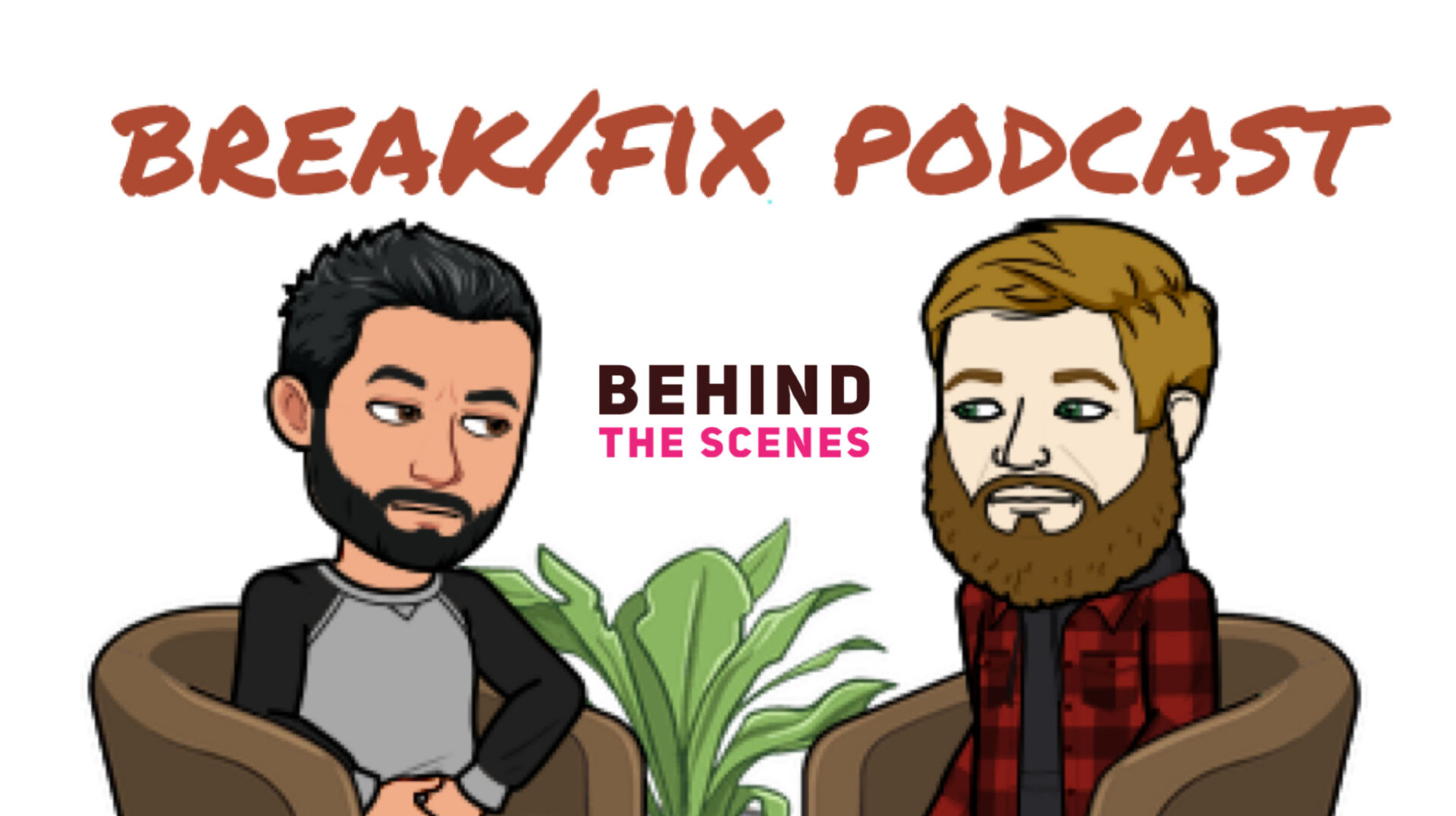
Consider becoming a GTM Patreon Supporter and get behind the scenes content and schwag!
Do you like what you've seen, heard and read? - Don't forget, GTM is fueled by volunteers and remains a no-annual-fee organization, but we still need help to pay to keep the lights on... For as little as $2.50/month you can help us keep the momentum going so we can continue to record, write, edit and broadcast your favorite content. Support GTM today! or make a One Time Donation.
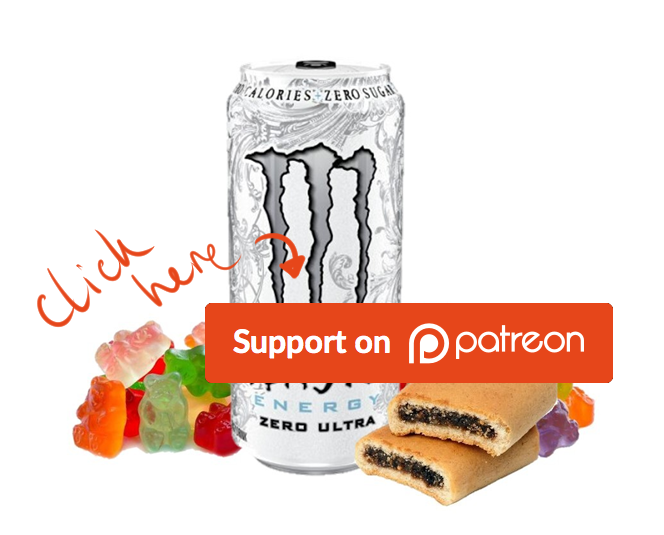
If you enjoyed this episode, please go to Apple Podcasts and leave us a review. That would help us beat the algorithms and help spread the enthusiasm to others by way of Break/Fix and GTM. Subscribe to Break/Fix using your favorite Podcast App:
 |  |  |
There's more to this story!
Be sure to check out the behind the scenes for this episode, filled with extras, bloopers, and other great moments not found in the final version. Become a Break/Fix VIP today by joining our Patreon.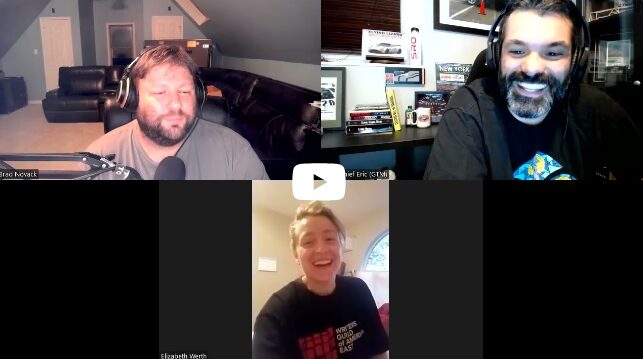
All of our BEHIND THE SCENES (BTS) Break/Fix episodes are raw and unedited, and expressly shared with the permission and consent of our guests.
To learn more about Elizabeth be sure to check out her website at www.elizabeth-blackstock.com or follow her on social media @elizablackstock on instagram, and @eliz_blackstock on Twitter, or check out her work on Jalopnik, A Girls Guide to Cars, Donut Media Podcast and many other automotive outlets.
#tbt blast from the past!
Meeting Elizabeth for the first time at Watkins Glen in 2019 (below) during Crew Chief Brad’s bachelor party – LOL! #goodtimes #sendit #caseofrichenergy
Get Rich or Die Trying: How One Man Took Auto Racing’s Biggest Stage for a Ride of His Own

Formula One’s biggest story in 2019 didn’t take place on the track. William Storey and his energy drink brand, Rich Energy, signed on as a title sponsor for the Haas F1 team. What followed was one of the most visible scandals in the sport’s history, culminating in unpaid funds, lawsuits, Twitter spats, and an unceremonious falling out.
Written by Elizabeth Blackstock alongside former Jalopnik co-worker Alanis King this novel is based on their initial research into the brand’s mysterious background, the book is available on Amazon as well as MacFarlane Publishing. Order yours today!
Recommended Reads
- Reading List
- Goodreads



